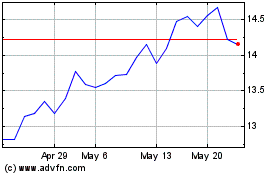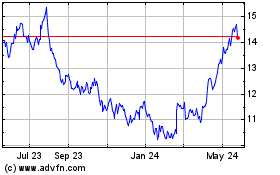Asian Shares Mostly Down on Skepticism About OPEC Deal
28 November 2016 - 4:00PM
Dow Jones News
Expectations that an Organization of the Petroleum Exporting
Countries production deal was unraveling dominated Asian trade
Monday, adding volatility to regional stocks and currencies.
OPEC officials said Saudi Arabian oil officials won't attend a
meeting Monday with Russia and others ahead of the 14-nation
cartel's closely watched meeting Wednesday.
Japan's Nikkei 225 was down 0.8% and Australia's S&P/ASX 200
was down 0.4%, while Hong Kong's Hang Seng Index was up 0.5%.
The price of Brent crude, a global benchmark, fell 3.6% on
Friday. This showed the market was starting to price in a failure
at this week's meeting, said Ric Spooner, chief market analyst at
CMC Markets. Brent crude extended its decline Monday, shedding 0.4%
in early Asia trade.
"We could see a big rally if they see a plausible agreement [on
a production cut]," said Mr. Spooner. "But assuming that OPEC does
not agree, for the next few months it does set up for a lower oil
price [in the] high 30s to low 40s range. We've still got big
inventories and supply overhang."
The oil gloom hit Asia's biggest energy stocks. In Australia,
Woodside Petroleum was down 2.5% and BHP Billiton, whose
second-biggest division is petroleum, was down 2.3%. Japanese oil
explorer Inpex was down 1.7% and in Hong Kong, Chinese oil major
Cnooc fell 1.4%.
The drop in oil prices is hitting U.S. inflation expectations,
which has pulled down U.S. Treasury yields, which has finally
knocked back a lengthy dollar rally.
The yield on 10-year U.S. Treasurys was last at 2.330%, down
from 2.359% on Friday, according to Thomson Reuters.
Asian currencies were broadly up Monday. The Korean won gained
0.4% and the Singapore dollar rose by 0.5%.
The Japanese yen was the biggest gainer in Asia on Monday,
rising 1.3%, partly as traders sought the safety of the yen on the
view OPEC's production deal was unraveling.
"Guys are very very nervous about the oil scenario and you see
that expressed in the sensitive pair," said Oanda senior
foreign-exchange trader Stephen Innes, referring to the U.S. dollar
and the yen.
Toyota Motor fell 1.2%, as Japanese exporters are less
competitive when the yen strengthens.
Japanese financial companies were hit by lower yields for
Japanese and U.S. government bonds, as the institutions depend on
investment income from the securities. Nomura Holdings was off 1%
and Dai-ichi Life Holdings fell 1.4%.
The yield on 10-year Japanese government bonds was last at
0.015%, sharply lower than 0.037% on Friday.
The Hang Seng Index strengthened after news Friday that the
trading link connecting the Shenzhen and Hong Kong stock exchanges
will open Dec. 5, allowing foreigners to invest in China's
fastest-growing companies.
Other important market events this week include the release of
U.S. jobs figures and purchasing managers' indexes, including the
U.S. ISM manufacturing PMI data due Thursday.
Rachel Rosenthal, Kenan Machado and Rhiannon Hoyle contributed
to this article.
Write to Willa Plank at willa.plank@wsj.com
(END) Dow Jones Newswires
November 27, 2016 23:45 ET (04:45 GMT)
Copyright (c) 2016 Dow Jones & Company, Inc.
Hang Seng Bank (PK) (USOTC:HSNGY)
Historical Stock Chart
From Nov 2024 to Dec 2024

Hang Seng Bank (PK) (USOTC:HSNGY)
Historical Stock Chart
From Dec 2023 to Dec 2024
